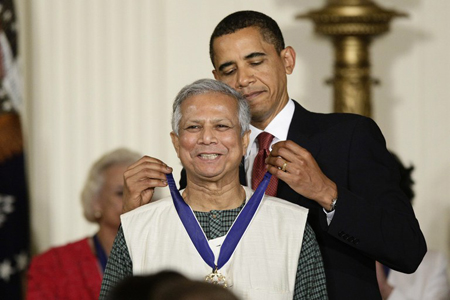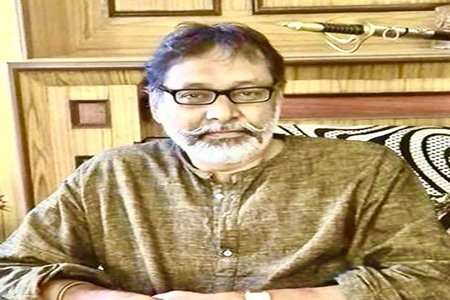

The development of Bangladesh has undoubtedly hit Indian geo-strategic-economic interests to a great extent. It will virtually be impossible for India to withstand the massive jolt for a long time to come. The effect will be both on India’s soft power as well as hard power initiatives in the South East region.
As things stand today, with the fall of Awami League government and subsequent departure of Sheikh Hasina, India’s much ambitious ‘Act East Policy’ now stands seriously handicapped. The friendly Bangladesh which was expected to play a key role in this regard is not any more there. And with the dark shadow looming large over the ‘Act East Policy’ implementation – effectively and meaningfully –in near future, the entire North East now remains dumbfounded and upset. Worst sufferer is, however, Tripura.
Several projects –some of which are already completed and some on the verge of completion – will now virtually be sent to the backburner.
Mohammed Yunus, the banker who got Nobel for peace, and is known as handpicked man by the USA, is going to be at the helm of affairs and Islamic radical outfits will be playing key roles. Md Yunus a strong Hasina bête noir has already expressed his displeasure for what he said New Delhi’s excessive ‘liking for Hasina’ instead of ‘people of Bangladesh’.
In that scenario, there are reasons to believe that the next government will not have very sweet relations with India- at least at the beginning or say for the next three to four years. And Tripura will be at the receiving end.
Tripura will bear the brunt of the Bangladesh developments in various ways. First, the bilateral trades that have been ongoing for many years and, of late, has shown positive trends will be affected. The border haats’ future will be uncertain. There also remain the chances of increased migration of Bengali Hindus from Bangladesh under pre-designed persecutions.
But the immediate effect will be seen on the Agartala Akhaura Rail way project, Sabroom- Chittagong connectivity project using Maitri Setu and subsequently the much touted SEZ is likely turn out to be a stillborn. In fact, neither the Agartala-Akhaura rail link nor Sabrum-Chittagong connectivity project is going to start anytime soon.
Announcement of MBB Airport as an International airport is also uncertain as now only a flight to Bangkok from here can be expected in case the airport gets the international tag.
When Awami League was in power, in case of emergency, Bangladesh allowed its territory to bring the essential commodities to Tripura. Now such a friendly gesture is not at all expected.
The cultural exchanges will also come to a grinding halt for a while. Several writers , artists , journalists et al from both the countries used to visit important cities and towns individually or in groups or as part of institutions. This will stop.
Tripura’s tourism plans that envisaged development of tourist destinations with 1971 Bangladesh Liberation War memories with ADB fund are also hit.
The new dispensation will never allow India to access Chittagong port. Because it was through the Chittagong port mainly that India was supposed to reach out to the South Asia region and its market. The geo strategic importance of Chittagong is huge for India’s economic development and ambitious over $5 trillion economy.
Such an ambition—which appears to be, indeed, attainable- is potential enough to upset many Global powers. The USA is one among them.
While the USA lost the Gulf countries as far as its trade and economic interests are concerned, the South East Asia now remains to be the most fertile ground and desirable destination. And none really likes to have a competitor in a high yielding business field. With Bangladesh coming under its influence Washington is now in a position to counter the rise of two Asian giants –India and certainly China in South East Asia and in extension ASEAN countries.
It is widely believed that the USA played the key role behind this uprising in Bangladesh to unsettle Sheikh Hasina. That Sheikh Hasina was having a frosty relation with the USA was known for long as Washington was not hiding its displeasure at her being elected time and again and having a tilt toward India, and to some extent to China too.
But revelation that the USA was determined and going to do something that it always did, came from neither New Delhi nor Beijing. It was actually a Russian diplomat who first in no uncertain terms informed the world about the USA’s design.
Russian Foreign Ministry Spokeswoman Maria Zakharova way back on November 23, 2023 cautioned openly in a media interaction that the USA was trying to foment trouble in Bangladesh a la Arab Spring.
She said, US Ambassador to Bangladesh Peter Haas was openly interfering in Bangladesh’s internal affairs.
“At the end of October, US Ambassador to Bangladesh Peter Haas met a member of the local opposition to discuss plans for organising anti-government rallies. Such actions amount to nothing less than gross interference in internal affairs,” said Maria Zakharova .
“We have repeatedly highlighted the attempts by the US and its allies to influence the internal political processes in Bangladesh under the guise of ensuring that the upcoming parliamentary elections in the country are ‘transparent and inclusive’,” Zakharova said.
During the students’ protest also the USA was openly critical of Hasina government and it tried to garner support for the protesters. It was alleged that media outlets, political leaders, NGO leaders, religious elders, academics, intellectuals et al were selectively used with various means.
Md Yunus was also heard giving statements and his coinage of words always reflected what the USA’s sentiments.
The USA used the Bangladesh army in 1975 against Sheikh Mujibar Rahaman, this time also it is alleged that Washington used a section of the army to oust Sheikh Hasina. Both happened in the month August only. In 1975 it was CIA Dhaka station chief Philip Cherry ( and of course Henry Kissinger), this time it was Peter Haas and US Assistant Secretary of State for South and Central Asia Donald Lu.
This time the USA was all praise for the Bangladesh army- for its ‘restraint and not going for crackdown on the protesters’ and its statements were loud and clear. While this praise sounds innocuous and well meaning, the eye brows were raised when it was found that Bangladesh army was seen vandalizing Sheikh Mujibar Rahaman’s statue- a stark reminder of 1975 coup-, or openly helping –or remaining silent spectator as the street thugs carried out looting and ransacking Ganavaban, government properties or attacking police stations. The USA did not utter a single word against such un-military behaviour.
Besides, when the protesters on July 19 stormed Narsingdhi jail and freed 826 convicts and criminals and looted 86 arms and 9000+ bullets from the jail maalkhana, or lynched 13 policemen in a police station, the USA did not come out to condemn these incidents. In fact, the storming of jail and releasing the hard-core convicts were a glaring example as to how criminals were brought in amongst the students protesters. The looting of arms also indicated that massive street violence would be on card.
It is a different and separate matter that despite clear indication from Russia and obviously ground reports from Dhaka and other parts of Bangladesh, Indian establishment failed to act decisively and save a friend in need. With Hasina gone and Bangladesh showing the trends of going to become another Afghanistan due to the USA misadventure again, the entire geo-political-strategic-economic plans of India will have to be reframed. And then it will take time to put the whole plan afoot and gain some foothold – for the eastern part. India in a way also failed to protect the Hindus in Bangladesh. Their seriously uncertain condition and sweeping persecution, atrocities against them will have a tailspin effect in near future, Tripura is likely to be the most affected once again.
As for Tripura, there is also a chance that the Islamic radicals will seek to create some assets in Tripura as a force multiplier.
There is every possibility that radical Islamists will be now be holding immense power a la Afghanistan, and Bangladesh within its territory may face rise of Islamic terrorism –only to spill over to India.
Nevertheless, it is highly unlikely that DGFI-which was formed and used to work like ISI when BNP was in power- or any anti-Indian political or religious or semi political parties / NGOs will be able to foment militancy in Tripura. The Situation has changed and socio-economic conditions of the indigenous people have changed considerably and a sense of financial stability has set in. Not many tribal youths will now be ready to take up arms right at this moment leaving aside his car or bike or a good cosy home for an uncertain jungle life. But there are possibilities that DGFI , Islamic radicals and Pakistan (ISI) influenced politicians will seek to re-establish their old links with some tribal politicians of the state who once spent many years in Bangladesh under their patronage. The objective will be to destabilize the political and communal environment in the state.
No one thus will be surprised, if in near future, some tribal leaders with militancy background is seen highly active, traveling too much and making highly communal statements.












